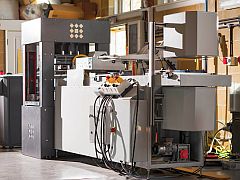 Surface Generation presented its new Multiplexing compression moulding technology for high-volume manufacturing that improves throughput; parts taking more than six minutes using traditional compression moulding can now be produced in two minutes using Multiplexing.
Surface Generation presented its new Multiplexing compression moulding technology for high-volume manufacturing that improves throughput; parts taking more than six minutes using traditional compression moulding can now be produced in two minutes using Multiplexing.
Developed to form fibre-reinforced plastic components with greater speed and precision, Surface Generation says that Multiplexing uses a unique transfer process with a pressure containment cassette that allows mould faces and laminates to be held at predefined loads, even outside the press.
Mould faces are loaded into cassettes and passed through a series of material loading, preheating, moulding, cooling and demoulding stations, which precisely control the temperature and pressure applied. The use of multiple cassettes, and multiple preheating & cooling stations minimises time within the press and makes it possible to achieve Takt times of as low as one minute.
Surface Generation says its PtFS technology is central to the system, allowing temperatures to be dynamically controlled to the exact local requirements of each part. By adapting heating and cooling levels in real-time, quality is assured and throughput maximised. This major PtFS advancement transforms high-volume compression moulding. Traditional transfer processes use laminate preheating, with cold tools to speed production. With PtFS and Multiplexing the mould heats, stabilises and cools parts, allowing the press to open early and freeing this expensive bottleneck to run again.
A series of open days are planned for the autumn for customers to see Multiplexing being used for thermoplastic compression moulding, along with PtFS in more conventional injection moulding and thermoset Out-of-Autoclave applications.


